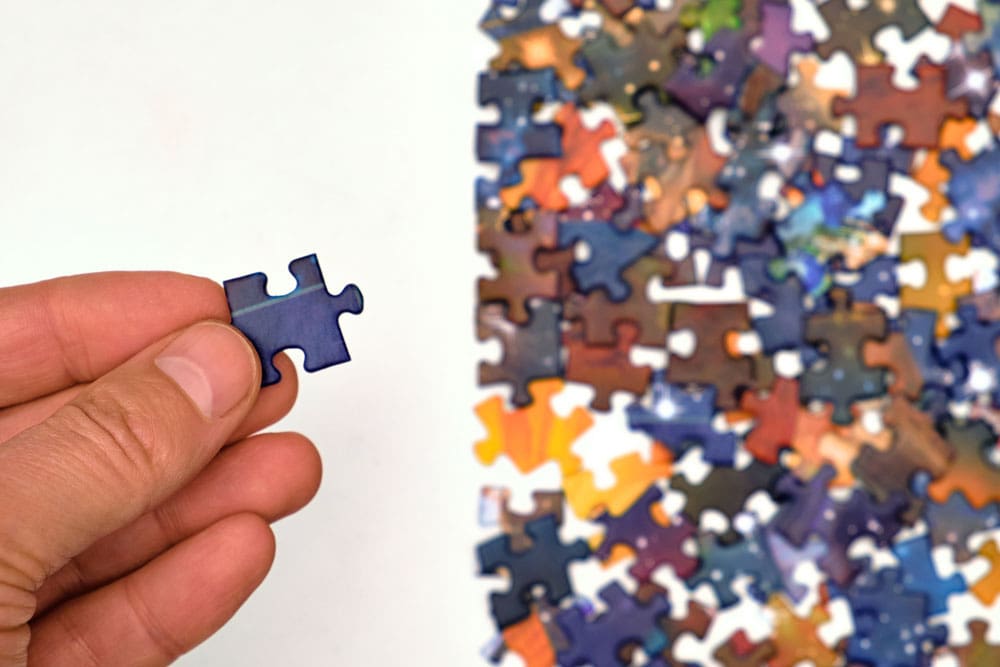Lots of people enjoy solving puzzles, and there are plenty of puzzles out there to solve. There are word puzzles and number puzzles and matching puzzles—and seemingly endless varieties of each category. Just look at this list of Wordle variations!
For the purposes of this blog post, however, we are going to focus on jigsaw puzzles. Whether a puzzle has 50 pieces or 5,000 pieces, jigsaws offer the satisfaction of overcoming chaos and creating order. And the steady progress of putting the pieces together to form a picture can be engaging and relaxing. (The puzzle company Brain Tree Games really leans into this idea.)
Sometimes, putting together a successful recovery journey can feel like a jigsaw puzzle. You might not initially see how various aspects of recovery fit together, and it may take some time to get everything sorted out. But as the picture becomes more and more clear, you will have linked together the pieces that can lead to a lasting recovery.
The Corner Pieces
Many folks start working on a jigsaw puzzle by finding all the edge pieces and basically creating the frame for the rest of the pieces. As part of that process, the person doing the puzzle finds the four corner pieces, which serve as a sort of foundation that can be built upon as you move forward.
We might argue that your recovery puzzle also features four corner pieces—pieces that are really the cornerstones of the recovery process.
Let’s take a look at each one:
- Corner number one: Attending recovery meetings regularly. Whether you choose a 12-Step program or another recovery organization, going to meetings regularly is an essential part of your recovery. In these meetings, you can give and receive support in a community of people who understand what you have gone through and what you are going through now. That sense of mutual support is a powerful thing for those in recovery.
- Corner number two: Getting regular exercise. Not everyone is excited about exercise, but the fact is it is important for everyone—and especially important to those in recovery from a substance use disorder. Regular exercise supports your physical health, of course, but it also supports your mental well-being. In turn, good physical and mental health supports your ongoing recovery.
- Corner number three: Securing restful sleep. While sleeping might seem like the opposite of exercising, getting enough rest has similar benefits to working out. Sleep is good for your mental and physical health—and therefore good for your recovery. We have some tips for getting the rest you need.
- Corner number for: Focusing on healthy eating. Here is another way to support your physical well-being, your mental health, and your recovery. Making good food choices is a wonderful way to provide your body and brain with what they need to function well. And again, when your body and brain are functioning well, your recovery is more likely to roll on day after day.
Working Inside the Puzzle Frame
After the edges have been put together, many people start working on specific sections of the puzzle. They might spot a bunch of red pieces that look like they are probably part of the upper left-hand corner of the puzzle. Or they might spot some pieces with letters on them and bring them all together to form some words that appear in the image. Or they might spot a bunch of different pieces that can be pieced together to make some key part of the puzzle.
The person doing the puzzler can work on these things in any order that appeals to them—and that is true of the following pieces of the recovery puzzle, too.
- Consider mindfulness or yoga practice: Both mindfulness and yoga encourage us to stay in the present moment rather than ruminating about the past or worrying about the future. That can be an important skill in recovery because regrets and worries can be overwhelming if they are indulged too much. A key piece of your recovery puzzle may well involve learning to rest your attention in the present.
- Build and maintain positive relationships: We have already talked about the ways a recovery group supports your recovery. But meetings are not a sufficient network of social connections. You also need strong relationships with friends and family members who will support you and your ongoing recovery over time. Part of putting these pieces together is making sure you are a good friend to others, too.
- Find ways to successfully manage stress: Stress is a part of everyone’s life, but too much stress puts your recovery at risk. That is why it is important to find ways to rest, relax, and recharge. You can, for example, take up an engaging hobby (like doing puzzles!). You could get better at leaving work at work and guarding your personal time. You can make sure a vacation is in your calendar so that you will take a much-needed break from your day-to-day responsibilities. Piecing together a stress relief plan is always an excellent idea.
We Are the Answer to the Substance Use Disorder Puzzle
At French Creek Recovery Center in Meadville, Pennsylvania, we help individuals solve the puzzle of putting drugs and alcohol behind them to start a recovery journey with confidence.

